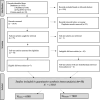This is a preprint.
Sex Differences in the Comorbidity between Attention Deficit-Hyperactivity Disorder and Posttraumatic Stress Disorder: A Systematic Literature Review and Meta-Analysis
- PMID: 39830260
- PMCID: PMC11741499
- DOI: 10.1101/2025.01.10.25320323
Sex Differences in the Comorbidity between Attention Deficit-Hyperactivity Disorder and Posttraumatic Stress Disorder: A Systematic Literature Review and Meta-Analysis
Update in
-
Sex differences in the comorbidity between attention deficit-hyperactivity disorder and posttraumatic stress disorder: A systematic literature review and meta-analysis.Gen Hosp Psychiatry. 2025 Jul-Aug;95:32-39. doi: 10.1016/j.genhosppsych.2025.04.003. Epub 2025 Apr 12. Gen Hosp Psychiatry. 2025. PMID: 40252259
Abstract
Objective: Attention Deficit-Hyperactivity Disorder (ADHD) and Posttraumatic Stress Disorder (PTSD) are often comorbid and share a common core of symptoms. However, sex and gender-related factors significantly influence their prevalence, clinical presentation, and diagnosis. Here, we conducted a systematic literature review and meta-analysis to examine sex differences in ADHD/PTSD comorbidity during childhood and adulthood.
Methods: A scoping review of PsycINFO and PubMed yielded 13 eligible studies with complete outcome data. We conducted fixed-effects meta-analyses of the sex-stratified prevalence of ADHD/PTSD using pooled odds ratios (OR) with a 95% confidence interval (CI). Fixed-effects subgroup analyses were performed using age as a subgroup. Effect size heterogeneity was assessed using the I2 index and Cochran's Q test.
Results: In the whole sample (N= 13,585; F= 7005, M= 6580), the diagnosis of ADHD/PTSD was significantly higher in females than in males (OR = 1.32, p = 0.02). Between-study heterogeneity was low-to-moderate and not significant (I2 = 41%; p = 0.06), validating the fixed-effects model. Age-stratified subgroup analyses revealed higher ADHD/PTSD odds in females compared to males only in adult populations (OR=1.41; p = 0.01). Additionally, females were more likely to be diagnosed with both disorders in studies where ADHD was the primary diagnosis (OR = 1.60; p = 0.002), and in studies employing structured clinical interviews as diagnostic tools (OR = 1.46; p = 0.009).
Conclusions: Our study is the first to show that the association between ADHD and PTSD is stronger in females, suggesting that ADHD may increase risk for PTSD in a sex-specific manner.
Keywords: ADHD; Attention Deficit-Hyperactivity Disorder; PTSD; Posttraumatic Stress Disorder; gender; meta-analysis; sex.
Conflict of interest statement
Declaration of competing interest: The authors declare no competing interests.
Figures
Similar articles
-
Sex differences in the comorbidity between attention deficit-hyperactivity disorder and posttraumatic stress disorder: A systematic literature review and meta-analysis.Gen Hosp Psychiatry. 2025 Jul-Aug;95:32-39. doi: 10.1016/j.genhosppsych.2025.04.003. Epub 2025 Apr 12. Gen Hosp Psychiatry. 2025. PMID: 40252259
-
Posttraumatic stress disorder in adult attention-deficit/hyperactivity disorder: clinical features and familial transmission.J Clin Psychiatry. 2013 Mar;74(3):e197-204. doi: 10.4088/JCP.12m07698. J Clin Psychiatry. 2013. PMID: 23561240
-
Prevalence and comorbidity of attention deficit hyperactivity disorder in Spain: study protocol for extending a systematic review with updated meta-analysis of observational studies.Syst Rev. 2019 Feb 11;8(1):49. doi: 10.1186/s13643-019-0967-y. Syst Rev. 2019. PMID: 30744675 Free PMC article.
-
Association of Attention-Deficit/Hyperactivity Disorder in Childhood and Adolescence With the Risk of Subsequent Psychotic Disorder: A Systematic Review and Meta-analysis.JAMA Psychiatry. 2021 May 1;78(5):519-529. doi: 10.1001/jamapsychiatry.2020.4799. JAMA Psychiatry. 2021. PMID: 33625499 Free PMC article.
-
Attention-deficit/hyperactivity disorder and post-traumatic stress disorder adult comorbidity: a systematic review.Syst Rev. 2025 Feb 14;14(1):41. doi: 10.1186/s13643-025-02774-7. Syst Rev. 2025. PMID: 39953536 Free PMC article.
References
-
- “Attention-Deficit/Hyperactivity Disorder (ADHD) - National Institute of Mental Health (NIMH).” Accessed: Nov. 22, 2024. [Online]. Available: https://www.nimh.nih.gov/health/statistics/attention-deficit-hyperactivi...
-
- Kessler R. C., Berglund P., Demler O., Jin R., Merikangas K. R., and Walters E. E., “Lifetime Prevalence and Age-of-Onset Distributions of DSM-IV Disorders in the National Comorbidity Survey Replication,” Arch Gen Psychiatry, vol. 62, no. 6, p. 593, Jun. 2005, doi: 10.1001/archpsyc.62.6.593. - DOI - PubMed
-
- Adler L. A., Kunz M., Chua H. C., Rotrosen J., and Resnick S. G., “Attention-Deficit/Hyperactivity Disorder in adult patients with Posttraumatic stress disorder (PTSD): Is ADHD a vulnerability factor?,” Journal of Attention Disorders, vol. 8, no. 1, pp. 11–16, Aug. 2004, doi: 10.1177/108705470400800102. - DOI - PubMed
Publication types
Grants and funding
LinkOut - more resources
Full Text Sources



